 There was a day and age when every young girl was taught to sew in their Home Economics class at school, if not at home with their mom or grandma. But those days have long since gone by; and today, someone that can sew has a world of opportunity to make money working from home. How much money you can make depends on your skill level, equipment, availability to do jobs quickly, and your creativity.
There was a day and age when every young girl was taught to sew in their Home Economics class at school, if not at home with their mom or grandma. But those days have long since gone by; and today, someone that can sew has a world of opportunity to make money working from home. How much money you can make depends on your skill level, equipment, availability to do jobs quickly, and your creativity.
A basic sewing machine and the ability to repair torn seams, replace zippers, hem garments, and/or make simple alterations is enough to get you started.More advanced skills and equipment will be required to offer higher quality services.
You’ll need to start by determining what kind of sewing you enjoy and want to do on a regular basis. You may want to start with something simple and work your way up as your speed and skill increase.
Here is a short list of sewing projects just to get you thinking about what could bring you a regular source of income:
– Minor repairs and alterations.
– Home decor items (pillows, blankets, curtains, drapes, place mats, napkins).
– Bags, totes, purses.
– Soft children’s toys.
– Doll clothes.
– Receiving blankets.
– Aprons.
– Canvas items for boats, yachts, camping.
– Banners (shops that produce printed banners usually need to have raw edges finished).
– Wedding gowns, veils, bridesmaid dresses.
– Prom or fancy party dresses.
– Suits, vests, ties, cummerbunds (cummerbunds).- Custom outfits for choral groups, dance teams, drill teams, karate classes, period reenactment groups, local sports teams, etc.
To help you determine what to charge, answer these six questions:
1) How long will it take to complete the project?For simple projects, you can probably come up with a pretty good idea how long it takes you to sew a hem, for example. To get better at pricing, start a notebook with a list of your projects and how long it took you to complete each one.This will help you determine what to charge for various projects as you go along.More complex projects may require that you charge based on time and material. It’s advisable to set a ceiling on what you will charge someone for their project. Your customer will be more willing to give you the job knowing that, no matter what, it won’t cost them more than ‘X’ to get their project done.
2) How much do you want to pay yourself per hour?
3) What are your equipment/material costs?(sewing machine, machine maintenance, special machine attachments, iron, ironing board, pins, needles, thread, material, electricity, etc.)
4) How much will it cost to advertise?(business cards, fliers, brochures) You can get inexpensive yet professional looking items from places like Vistaprint.
5) Do you need a business license? If you have a lot of customers coming and going from your home, check with your local authorities for a special license or zoning requirements.
6) Do you know what your competition charges? You may have an advantage over your competition if you’re able to offer faster turn around times, pick up and delivery, and quality workmanship.You won’t want to be the highest price in town unless your skill set warrants it. At the same time, you are doing this as a business, not just a hobby, so you also don’t want to give your work away.
Where you should advertise:
– Ask friends and family to spread the word and pass out your business cards or brochures.
– Your Facebook page.
– At your local dry cleaner. Are they in need of someone who has your skills to take on extra or overflow work? Will they allow you to leave your business card or advertise your services? Possibly give you referrals?
– At your local fabric store and arts and crafts stores. Many will allow you to post a brochure or business card.
– Try your local consignment shop. They may receive items that need simple repairs done before it can be sold.
– Join organizations like the American Sewing Guild to stay in touch with others who are doing the same thing as you.
– Your local church, Community group, or other organization may help you spread the word.
– Craigslist if you’re offering sewing services or selling sewn items.
– Craft shows, Etsy, and eBay if you’re selling sewn items.
In closing, take care to produce a quality product. Quality should not be sacrificed for lack of time or attention to detail. Unhappy and dissatisfied customers will kill your business. As will promising more than what you’re able to deliver.
Your success is closer than you may think! There are people everywhere in need of a service you can provide!




